|
My debate with Aegis. (20 viewing) Cardoso, CyborgJesus, Drizel, fifi, gasto, Gofoboso, Kartraith, Kristoff Greenwood, Kymatica, Labyrinth, madz3000, Maelkoth, Meshuggeth, neverquit, pureblueearth, Relic180, shot2pieces, straw prophet, VenusWorld, (1) Guest
 | | |
|
TOPIC: My debate with Aegis.
|
|
Re:My debate with Aegis. 18 Hours, 11 Minutes ago
|
|
aegis wrote:
Now, let’s look at the proposals of the Venus
Project. Its first claim is that the current supply and demand balance
results in a lot of demand being unsatisfied.
Wrong. The FACT not the CLAIM is that there is a lot of NEED left unsatisfied. I will get into that more later.
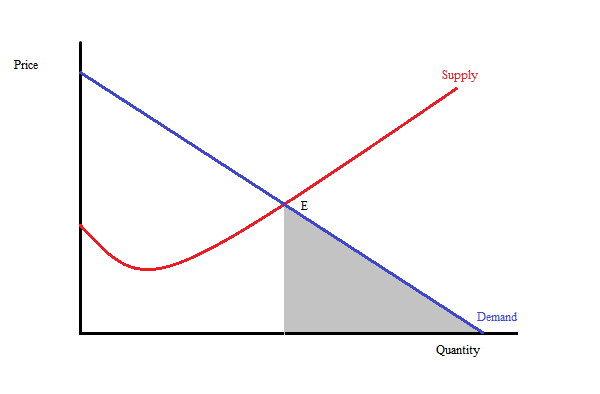
The grey shaded box represents all of the utility lost by producing at
the equilibrium point, E. Just because we found E to be the most
efficient production point does not mean that this other demand just
goes away; it represents utility that will not be realized.
According to the Venus Project, we should instead produce this item at the point where demand is fully satisfied.

This way, everybody gets the amount of Good X that they want. But let’s
look at what this does to the Production Possibilities Curve:
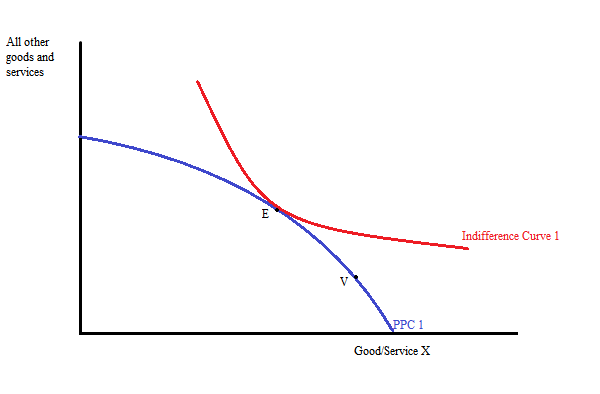
Quantity V (the quantity of production that has all demand satisfied) is
farther along the PPC than Quantity E. Resources need to be diverted
away from making other things to create these additional units of Good
X. So when we look at the indifference curve of the economy that results
in the utility had by completely satisfying the demand for X, we get
this:

The curve as a whole shifted inwards. Since we already established that
you want to be on the farthest out curve that you possibly can, we know
that the combined utility for all goods and services is now lower than
it was before. Why is this worse off? Well, let’s look at Good Y, which
uses some of the same resources as Good X
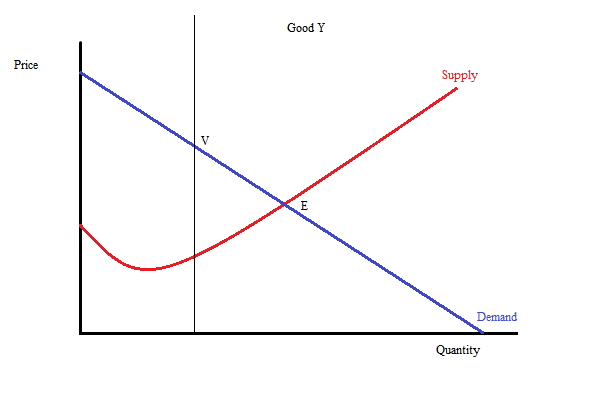
Since we just diverted resources away from Y to produce more of X, the
quantity produced of Y is now lower than E. On the production
possibilities curve, it is here:
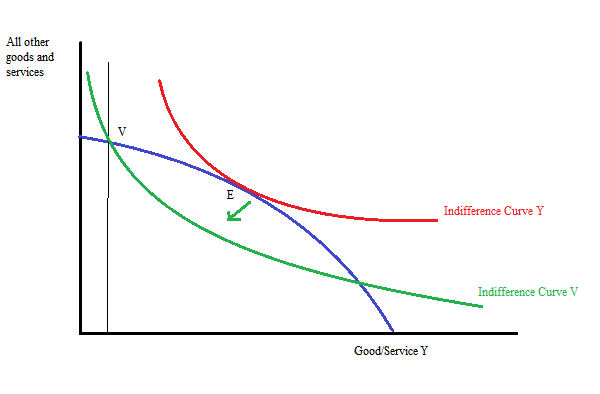
Just like X, the total utility is lower, but it is now caused by a
decrease in the production of the item rather than an increase. This is
repeated thousands of times across all goods and services that use the
same resources as X.
Again, you are leaving out mountains of pertinent information here.
Particularly the issue of where demand comes form in the inevitable
broken system that you get anytime you use money rather then simply
producing what is needed. A huge chunk of what is being demanded right
now is based in false needs such as fashion, and luxuries that are only
"valuable" due to society pressures and rewards for having certain
items. The 24 bedroom houses, personal private jets, expensive clothing
that has no real functional difference from cheaper clothing, etc.
Again, society was designed to pressure people to covet a great deal of
bullshit we simply do not need and would not even crave absent that
manipulation.
But what if we were able to create a
technological breakthrough that allowed X to be produced with fewer
resources? That would cause the production possibilities curve to shift
outward, and help correct the problem:
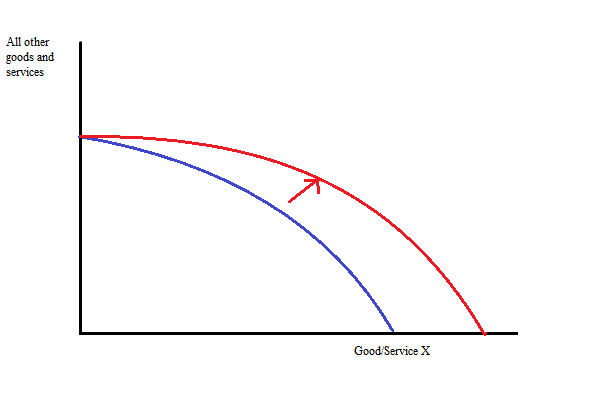
When we apply Quantity V to this graph for the production of Good X (so demand for X is fully satisfied), we get this:
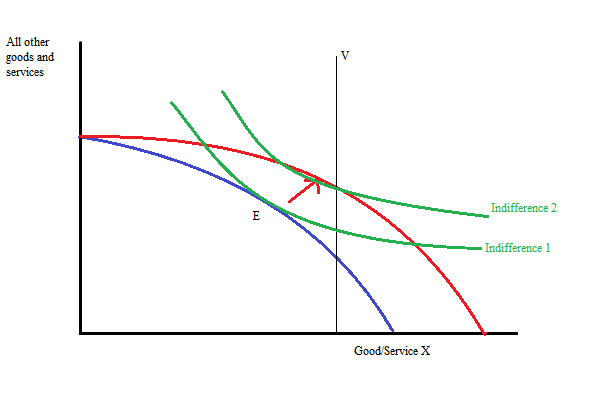
The utility curve still isn’t quite optimal (it still touches the
production possibilities curve in two places), but at least total
utility is higher. Let’s look at the effect on Good Y

There was no shift in this production possibilities curve, because the
technological advance that we had didn’t increase our ability to produce
good Y if we diverted all of our resources to it. However, it means
that we get more resources free to produce good Y that now don’t need to
be used to produce good X, so Indifference Curve V is allowed to shift
outward to Indifference Curve V 2. While this is an improvement over
Indifference Curve V, you can still see that utility as a whole is still
significantly lower than it had been when resources were optimally
distributed to begin with (the difference between optimality and reality
from Good X’s new graph is magnified here).
So in the above quote you again make a chart that we are all supposed to
accept as gospel where you dictate to us that the technological advance
is not going to increase production enough to fix the problem that you
created in the first place. You don't even know what technological
advance your referring to here, nor do you know what product your
producing.
Again y Total utility will remain lower than
optimal until you have enough technological improvements in the
production of good X that all demand is satisfied using no more
resources than were used at the optimal level to begin with. As we all
know, technological advancement, while rapid, still takes time. More
importantly, it takes resources.
Resources you use to advance one technology cannot be used to advance a
different one. By putting all of our resources into technological
advancements into Good X to increase its efficiency to the point where
we can finally see a total increase of utility, we are taking away from
the development of all other technologies. If you allow all things to be
produced at equilibrium, technologies advance at the optimal level;
resources are applied to advancing the technologies that will give the
greatest boosts to total utility.
Again your making a bunch of assumptions and trying to present them to us as facts.
Now we are getting into the problem of present
and future value again. By meeting the demand for X at the cost of
utility from Y, total utility is reduced. So resources are diverted from
the developing of all other technologies into developing capacity for X
in order to get our utility back to our original equilibrium.
Eventually, perhaps it is possible to get the production opportunity
cost of X back down to the equilibrium point and produce enough to both
satisfy total demand and not cost more than its marginal value to other
goods (namely in our example, good Y).
But all of that takes time, it could take 50 years just to elevate the
production of one good up to the point where our total utility is up to
our original equilibrium. But even then, we are worse off. We had to
wait 50 years to have utility that we rightfully should have had access
to from the get-go. We have 50 years of utility wasted, and that is
before you consider the extra loss you got from not expanding the
productive capacity of everything else, just so you could fully satisfy
the demand of one good (Good X).
No matter how you cut it, no matter what angle you analyze it from, you are worse off in this second arrangement, hands down.
Based on circumstances that you created that are not even based in anything.
Some other problems arise from the Venus Project: (this is going to be more of a list than full explanations)
There is no reason to conserve anything. I have been told by supporters
that goods produced under this arrangement would be both much more
durable than what we have under a market system (for example, a car
would not break after 100k miles), and that technological advancements
would be implemented into production and available to all immediately.
These are counter goals; if I have a car built that can last for 50
years, it is going to need more resources to build than a car that will
last 10 years. So each car produced is going to be more
resource-intensive than it otherwise would need to be. At the same time,
technological advances take place all the time. Every year, a new car
could be built that is better than the car produced a year before. So
now you have all these cars that are supposed to last 50 years that
everybody is trading in for these new cars after 1 year. All of those
resources that were used to make it last a long time were completely
wasted, and it means that all cars on the road should be replaced
literally every year. This is the same for pretty much every durable
product, you are saying that the resources should be invested that would
extend the lives, while at the same time saying that their lives should
be constantly cut short to advance the stock held by the People at any
given time.
There are a lot of ways you can design a product to accept upgrades
easily and efficiently. This is not currently done because of the profit
motive making it better in the long run to just have someone buy an
entirely new product. Also, we will be designing products that are very
easy to recycle.
So instead of using the current resources, which
involves replacing roughly 7% of all cars on the road every year (plus
extra to allow for growth), 100% of all cars would need to be replaced
every year. Assuming that you recycle literally every component out of
every single car, you still would be required to have 93% more cars
built every year than you would under a market system. This is because
you cannot recycle a car at the same time you are building it, you have
to build the car, give it to the person, who in turn gives you their
“old” car, which you can then recycle. Since 97% more cars are built
every year instead of 7%, you have to use more than 13 times as many
resources JUST for production of cars, and all of those resources are
going to come from every other thing that could be produced. This
applies to all goods and services; you are wasting many, many times more
resources than you otherwise would have to on turnover alone.
I already debunked this point above.
|
|
|
|
Neil Kiernan-
Official spokesman for the Venus Project.
v-radio.org/ |
|
|
Re:My debate with Aegis. 18 Hours, 8 Minutes ago
|
|
|
shawn111 wrote:
Economics is based off of scarcity (supply and
demand) and the monetary system. We have the technology to remove
scarcity (of the necessities of life) for everyone. The monetary system is an out-dated social construct that was only useful in allowing humanity to progress this far. Both Scarcity and The Monetary System are now irrelevant. Therefore --> Economics is now irrelevant.
You inevitably will defend economics since you have likely invested much
time and effort into learning. I challenge you to be objective in your
assessment of this topic instead of fervently defending your area of
so-called "expertise". Try to re-read this post without any personal
bias. If you have questions about any of the specifics of this post, I
(we) would be more than willing to explain to you why they are accurate.
Shawn111, while I understand where you are coming from, saying that he
will defend economics soley because he has invested so much time in it
is an ad hominem. Please don't do that.
|
|
|
|
Neil Kiernan-
Official spokesman for the Venus Project.
v-radio.org/ |
|
|
Re:My debate with Aegis. 18 Hours, 6 Minutes ago
|
|
|
U know Aegis, the way u
quote ur college books and college graphs makes this sound so ideal and
perfect, the only and the best way. But reality is not like in ur
college books.
U are forgetting many important things like:
- Interest - the main reason for inventing that debt money system, for sole purpose that bankers can make profit out of profit.
- the 95 % of the things u say are "goods" are actually worthless crap
produced only for fast profit not for true utility, and they quickly end
up in garbage. (that doesn't sound much utilizing to me)
- the wealth gap caused by those business leaders who want to cut their
spending on production by outsourcing and automation (which leads to
unhappiness and social stratification and unrest).
- the whole marketing charade for brainwashing the population to buy
that worthless crap so the owners can "maximize profits" regardless of
the utility of the product.
- not to mention wars for resources and such atrocities
- pollution and meaningless waste (but it seems u don't give a shit bout that so its pointless to say...)
Maybe it will work in ur perfect college book fantasy, but actually in reality it doesn't works...
Btw ur point bout the cars was nice, but from ur view i see that u don't
understand the aspects of RBE much. Ppl will NOT OWN cars, they will
use them when needed. So there would be no need to produce so much cars
in the first place. While i agrees with u that cars shouldn't be
produced to last so long if technological progress is in the process,
anyway that's only technical issue, it can be easily solved , by making
upgradeable cars and generally upgradeable stuff. And making it from
recyclable materials as much as possible.
What is more utilitarian? 100 companies that make same product and by
that they only needlessly multiply the product (and multiply the waste
of resources with that) and trying to make the consumers to buy it by
implanting false desires with marketing tricks, or one company that
makes that product for all in regard to actual realistic needs?
Needless competition and needless waste of resources, that's how i see capitalism.
|
|
|
|
|
|
|
Re:My debate with Aegis. 18 Hours, 2 Minutes ago
|
|
aegis wrote:
Now, before I am called out for ignoring reality,
let’s look at reality. It is clear that the system does not work at
perfect equilibrium; there is waste in the system that is lower than the
cost of recovery. There are a million cases where the price and
opportunity cost that is found by the market is different than the
actual cost or benefit to society. The main case where the actual cost
is higher is pollution; the true cost to all things is not expressed in
the market price for things that pollute. The main case when the actual
cost is much lower is education; the cost on society of education is
MUCH lower than what people have to actually pay in order to get it.
The cost of pollution at this rate goes far beyond anything that your
going to put on a graph, as no graph is going to matter when we are all
dead because the planet is not inhabitable.
I already showed that getting rid of money altogether does not solve this problem. So what does?
No you didn't.
At the risk of sounding cheesy, democracy does.
No it doesn't. Unless your going to make all campaign contributions completely illegal. Democracy is a joke.
We are able to tax and spend money, meaning
convertible resources. So if it is determined that the manufacture of a
car produces the equivalent of $100 in damage to the environment than is
accounted for in the price, we are able to tax that car for $100, and
use the proceeds to help reverse the damage. On the other side, if we
determine that the real “cost” of education is $500 less than it is
under the market, we can subsidize the cost of education by $500 out of
public funds, which lowers the cost to all, and results in more people
getting an education.
The idea of trading pollution back and forth is ludicrous. Just design products that don't pollute in the first place.
The real work that needs to be done is not
destroying the system we have, but working to make sure it runs as well
as it possibly can. People who have a passion need to follow that
passion; if you love building cars, train to be an automotive engineer
to help find a more efficient way to build cars to increase their
utility while decreasing the resource-intensiveness. I personally have a
passion for politics and economics, and so I divert my energies into
trying to get the bureaucratic system as a whole to run more efficiently
and better allocate those public resources to the most efficient
allocation to reflect total cost and benefits.
There is no way this system could be in any way manipulated to actually
take care of mankind. Oh, and FYI, it is not working if a small group of
people live extremely well, control all elections and the media. And
the masses get to grab whatever is left from the scraps off the table
that is getting smaller and smaller as the rich figure out more ways to
use technology to automate jobs with no concern for what this does to
everyone else.
gizmodo.com/5665523/robots-are-stealing-...ing-to-mit-economist
|
|
|
|
Neil Kiernan-
Official spokesman for the Venus Project.
v-radio.org/ |
|
|
Re:My debate with Aegis. 17 Hours, 58 Minutes ago
|
|
|
You
could of saved yourself a lot of trouble with the college lecture. Most
of this stuff we already know, but I do not agree with your conclusion
at all. Money is more then just a medium of exchange. It is a means that
resources can be squandered, overused, hoarded. Etc.
Based on my encounters with zeitgeist members, this will be the first
encounter with these graphs for most of the people here. As for your
comments on money, says who? Unless you literally stuff dollars under
your mattress, which is pretty universally regarded as a bad idea, it is
not sitting idle. Please provide sources and examples of squander,
overuse, and hoarding (which is the opposite of the other two), which do
not coincide with demand and utility functions.
Yes, and oddly enough in all of these "systems"
that are supposed to be "the most fair way" there are always small
groups of people who own 90% of the wealth and large groups that have to
somehow split the 10%. I do not call that a functioning system. I am
sure the wealthy think it's working just fine. You may not call
that a functioning system, but that does not mean it does not function.
Please define "wealth". Do you mean the means of production? It doesn't
really matter who owns that, since the demand and utility curves as the
system as a whole do not change and are still forced to come to an
efficient allocation. You should be the first to admit that increasing
your income does not necessarily make you happier, so the division of
income should not necessarily have any direct impact of the happiness of
the system as a whole.
Ok... yeah it's extremely convenient, for the
banks. Nevermind the fact that the money to pay back debts that are
issued with interest does not exist in the system in the first place...
Interest is an effect caused by both the present versus future value of
a resource (it is always worth less in the future than it is right now,
so by paying more back in the future, you are really just repaying the
original amount), and opportunity cost. In order to lend the money, the
opportunity cost of doing so has to be less than the utility gained by
doing it.
Since the only rational reason to borrow money is to use the increase to
add to the value of something, which must be greater than the cost to
borrow, the money comes from what you spend it on. Money is backed by
the value of collateral across the entire economy; by borrowing money to
create growth, you automatically create the money that you use to repay
the loan. Plus profit. That is, if you borrow rationally.
Profit is the root reason for all money systems
being corrupted. Again. And again. And again. And again. And again. It
is also what creates the disequilibrium because as soon as people are
handing over more units (money) then something is actually worth in
resources the imbalances start. But anyone in a Capitalist system has to
find ways to get more then they give because of the way the system is
set up. As time progresses the system gets more and more corrupt. Profit
as a motive has no concern for anything else. Including pollution,
inhumane working conditions, it influences politics and leads to wars.
Virtually all of mankind's problems can be directly linked to profit and
the pursuit of it. You cannot make a claim like that without
providing AMPLE sources for it. It does not create disequilibrium, I
showed graphically exactly how the balance between the opportunity cost
of creating an item, the utility gained by creating the item, the
diminishing returns gained from each additional unit created, the
increasing cost to scale of each item created, and the effect of the
production possibilities curve all work to make an efficient balance of
resources to satisfy current demand and fuel growth.
Please show me some evidence that this does not come to an efficient outcome. Simply saying so does not count as evidence.
You make it all sound so simple. But in practice
"demand" can be artificially created. And is. Advertising industries
engage in what amounts to brainwashing to convince you to buy products
you don't need that in many cases are actually harmful to you. (Like
having Edward Bernays figure out how to get women to smoke.) As long as
you have a profit motive, advertising, scams and theft will be present.
Demand is always artificially created. Otherwise we would all still be
hunter/gatherers. All of the smokers I know genuinely enjoy smoking; the
reason for this is because chemicals in cigarette smoke interact with
your brain to create both a dependency and a good feeling. They had
demand to use it; blaming social pressures is moot. 95% of everything
that humans do is in response to social pressures, since we are social
creatures.
Lets not forget all the money invested in pursuit
of control over the government through political campaigns and lobbying
to ensure maximized profit regardless of the consequences to other
human beings. Indeed, lets not forget. Lobby campaigns are
conducted by literally ever group of people from every walk of life.
Otherwise the government wouldn't know what the problems were, because
nobody would be telling them. In the end, it is still up to the people
to elect their representatives, and if they do not care for their
representative's voting record, they are more than able to vote them out
of office. These past two elections have demonstrated that point
wonderfully.
So far I am seeing a lot of flowery technical
language that is largely missing the point. It seems you are trying to
establish some things as reality with a few nice looking graphs that are
not based on any actual data.
so provide me with the actual data.
|
|
aegis

Level 1 Poster
Posts: 33


|
|
|
|
|
Re:My debate with Aegis. 17 Hours, 43 Minutes ago
|
|
|
Perpetual consumption
-A constant, cyclical rate of consumption must be maintained in order
for businesses to continue selling goods, and for consumers to continue
purchasing goods.
-This is confounded by our use of fractional reserve banking and
monetary creation, which further requires physical expansion of the
money supply in order to keep servicing the continually expanding debt.
Regardless of fraction reserve banking, the monetary system requires a
constant rate of consumption as business and workers require income to
survive.
-This system of perpetual growth and consumption is within a closed
system known as the Earth, the resources bestowed unto this planet took
millions of years to develop, therefore are finite. A infinite growth
economy within a finite resource system is guaranteed to collapse, as at
some point that infinite growth paradigm will collide with the physical
limits of our planet.
Labor for Income
-Machine automation is a very real trend, that over the last few decades
has completely transformed our abilities to produce goods. The real
issue is that companies will seek to automate as much as they can for
profit's sake, but this displaces the workforce, creating a large
population whose skills have been made obsolete my mechanization.
-This reduces purchasing power for the population, and as automation
increases, so will the gap between wealthy classes and poor classes.
-Eventually this trend will cripple the economy as the poor classes will
have less and less opportunity to obtain money, which diminishes the
businesses opportunity to sell goods and make money, essentially ending
capitalism and its labor for income paradigm.
Profit motive
-The profit motive reinforces socially detrimental behaviors. It also
creates a need for self preservation in the context of business. If a
new technology arrives that makes a company obsolete, that company and
all of those people involved would lose their livelihood. Consider the
oil conglomerate and the owning of car battery patents.
-The same could be said for the healthcare industry, it is more
profitable for the corporations and pharmaceautical companies to 'treat'
and 'service' health problems rather than fix them for good. If we
actually could cure and prevent all diseases, millions of people would
lose their job.
-Resources no longer are regarded as essential materials for life, but
rather opportunities for profit. If companies continually dump waste
into a river and spoil a local water supply, that company can now make
money by servicing the need for clean water.
-It is profitable for companies to seek the poorest, most destitute workers possible and pay as little as possible (sweatshops)
-It is profitable to influence political powers to side with corporate interests (corporate lobbying)
|
|
|
|
The YOU is virtual, there is no such
thing as true intelligence since technically yours is artificial
as-well. Consciousness is not physical, it is generated constantly by
you're brain based on you're conectome virtually in a constant feedback
loop. And as such it is emulatable and even portable. |
|
|
Re:My debate with Aegis. 17 Hours, 34 Minutes ago
|
|
Wrong. The FACT not the CLAIM is that there is a lot of NEED left unsatisfied. I will get into that more later. not to be snooty, but in a debate, all points brought up for discussion are called "claims".
Again, you are leaving out mountains of pertinent information here again, please provide that information.
Particularly the issue of where demand comes
form in the inevitable broken system that you get anytime you use money
rather then simply producing what is needed I already explained
where demand comes from. It is the aggregate of total utility for the
system for any particular good or service.
A huge chunk of what is being demanded right now
is based in false needs such as fashion, and luxuries that are only
"valuable" due to society pressures and rewards for having certain itemsYou
are mistaking "needs" and "demand". Demand is based on utility, need is
based on a biological necessity to continue life. Demand is based in
large part on personal tastes and preferences. With that in mind,
"fashion" and "luxuries" (luxuries apparently being everything you need
in addition to not dying in this context) are perfectly valid demands.
The 24 bedroom houses, personal private jets,
expensive clothing that has no real functional difference from cheaper
clothing, etc. Again, society was designed to pressure people to covet a
great deal of bullshit we simply do not need and would not even crave
absent that manipulation. So you are saying that the utility
gained from a private jet is fictional? What are you basing this off of?
Are you instead proposing that anything that is deemed a "luxury"
should not be produced?
So in the above quote you again make a chart that
we are all supposed to accept as gospel where you dictate to us that
the technological advance is not going to increase production enough to
fix the problem that you created in the first place. I never
alleged that you should accept the graphs as gospel. I also did not say
that technological advances would not allow production to increase
enough to fix the problem. What I did say is that if you focus on
increasing production of one good or service to the point where all
demand is satisfied, you do so at the expense of all other goods and
services. With natural economic growth, the production possibilities
curve of the entire system expands at a rate of roughly 2% a year. This
means that each and every supply and demand schedule also expands
outward at roughly 2% (as an average for the whole).
By focusing our efforts on producing enough of 1 or 2 items to fully
satisfy demand, we are hurting the utility gained from all other items.
As time progresses, technological advances are had across the board. At
this point in time, there are a few things that we have been able to
fully satisfy demand for. The first item off the top of my head is corn;
we have advanced our agricultural technology to the point where not
only is corn cheap enough for literally all people to buy enough to
satisfy their personal demand, but we give away tens of thousands of
tonnes each year in humanitarian efforts. And production keeps rising.
If you allow the system to function at (or very near) equilibrium, what
happens is that your PPC will continue to expand due to technological
progress.
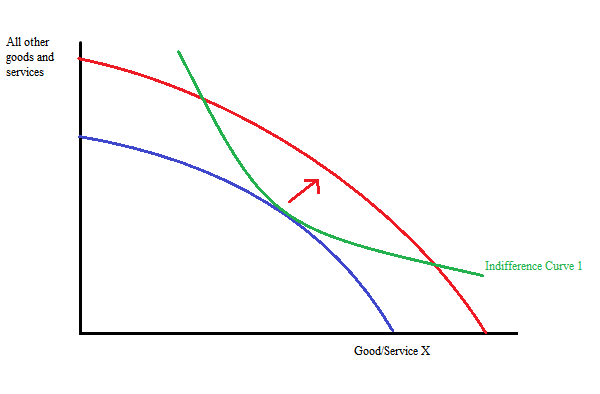
I will put quantity V back on this graph, and add the new equilibrium indifference curve (ignoring quantity Z)
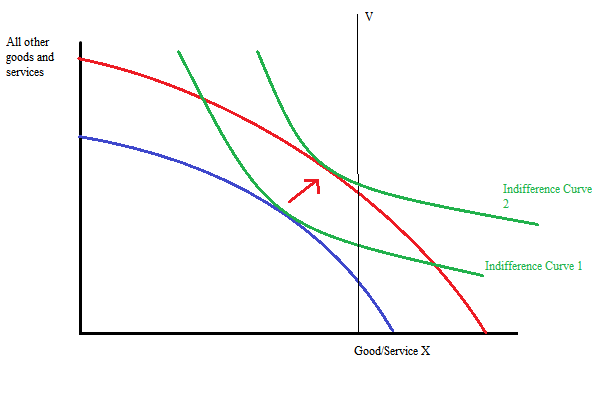
Now, the productive capabilities of the economy as a whole have enabled
the shift from Indifference Curve 1 to Indifference Curve 2. This shift
has brought the equilibrium quantity of Good X much closer to Quantity
V, where all demand is satisfied. The difference between this and the
other scenario is that since the productive efforts were spread over the
economy as a whole, rather than towards fully satisfying one demand,
the productive capacity of EVERYTHING has increased, rather than just
the capacity for just that good or service. So Indifference Curve 2's
quantity of good X is increased, but not at the sacrifice of good Y (in
fact, good Y's capacity goes up as well, enabling it to more fully
satisfy its demand).
You don't even know what technological advance your referring to here, nor do you know what product your producing. what? I was using a generic model, so it doesn't matter.
Again your making a bunch of assumptions and trying to present them to us as facts. so please offer contradictory evidence.
There are a lot of ways you can design a product
to accept upgrades easily and efficiently. This is not currently done
because of the profit motive making it better in the long run to just
have someone buy an entirely new product. Also, we will be designing
products that are very easy to recycle... I already debunked this point
above.
The profit motive is currently based on creating products that are
balanced on their durability and the likelihood of the consumer to want
to trade up in the future. The cost of buying a durable good is
discounted over its useful life; if you buy a truck for $25,000 that you
expect to last for 5 years, you will discount it at a rate of $5000/yr.
If you buy a truck for $30,000 that you expect to last for 10 years,
you would discount it at a rate of $3000/yr. You would find the second
truck as less expensive; it offers more utility per resource exchanged.
However, if you intended to only use the truck for 5 years, then you
would discount the second truck at a rate of $6000/yr, and find the
first truck to give more utility.
Making it easier to recycle does not remove the fact that you have to
put forth the effort to do so. I live next to an auto scrap yard, I can
already assure you that there is not a scrap of vehicles that go to
waste.
|
|
aegis

Level 1 Poster
Posts: 33


|
|
|
|
|
Re:My debate with Aegis. 17 Hours, 24 Minutes ago
|
|
|
The
cost of pollution at this rate goes far beyond anything that your going
to put on a graph, as no graph is going to matter when we are all dead
because the planet is not inhabitable. And so how are you accounting for pollution? Not considering it a cost at all?
No you didn't. Yes I did, you have yet to offer any evidence to counter my position. Please do so before declaring victory.
No it doesn't. Unless your going to make all campaign contributions completely illegal. Democracy is a joke. Democracy is a joke? According to who? I personally love it.
he idea of trading pollution back and forth is ludicrous. Just design products that don't pollute in the first place. umm...
that would increase the resource intensity of products up
astronomically. Sometimes it is easier to clean up a mess rather than
avoid making it. If there is a coal plant that produces 10 tons of CO2 a
day, it is polluting. A geothermal powerplant that would be built to
replace it would cost half a billion dollars worth of resources. Why
would we invest all of that to build the geothermal plant if we could
use carbon capture technology paired with tree planting to eliminate the
CO2 pollution for half the cost?
There is no way this system could be in any way
manipulated to actually take care of mankind. Oh, and FYI, it is not
working if a small group of people live extremely well, control all
elections and the media. And the masses get to grab whatever is left
from the scraps off the table that is getting smaller and smaller as the
rich figure out more ways to use technology to automate jobs with no
concern for what this does to everyone else. What on earth are
you basing this on? Mankind is almost infinitely better off than it was
just 300 years ago. The global poverty rate has been driven down every
single year. In the United States and Western Europe, it is impossible
to starve to death. What metric are you using that says people are not
doing better?
|
|
aegis

Level 1 Poster
Posts: 33


|
|
|
|
|
Re:My debate with Aegis. 17 Hours, 6 Minutes ago
|
|
|
aegis wrote:
Based on my encounters with zeitgeist members,
this will be the first encounter with these graphs for most of the
people here. As for your comments on money, says who? Unless you
literally stuff dollars under your mattress, which is pretty universally
regarded as a bad idea, it is not sitting idle. Please provide sources
and examples of squander, overuse, and hoarding (which is the opposite
of the other two), which do not coincide with demand and utility
functions.
Squander? That would be using resources in a way that is not required
for anything outside of vanity. The desire for vanity being artificially
created.
Overuse of resources? That's basically everywhere on the planet with very little regard for the future of said planet.
Hoarding? I would say it's more about it being easy for a small group of
people who understand how to play the monopoly game of Capitalism to
end up with the vast majority of everything at the end of it. And owning
far more then they could ever possibly need.
You may not call that a functioning system, but that does not mean it does not function.
Right. I suppose when you put it that way a concentration camp "functions".
Please define "wealth". Do you mean the means of
production? It doesn't really matter who owns that, since the demand and
utility curves as the system as a whole do not change and are still
forced to come to an efficient allocation. You should be the first to
admit that increasing your income does not necessarily make you happier,
so the division of income should not necessarily have any direct impact
of the happiness of the system as a whole.
It is by no means irrelevant who owns the means of production. It puts
them in a position to determine if other people will have access to the
goods in question, or access to jobs to be able to find a way to be
useful to your system so that I can afford to buy the goods in question.
When someone owns the means of production they have a great deal of
power over other people that nobody should have in the first place.
Interest is an effect caused by both the present
versus future value of a resource (it is always worth less in the future
than it is right now, so by paying more back in the future, you are
really just repaying the original amount), and opportunity cost. In
order to lend the money, the opportunity cost of doing so has to be less
than the utility gained by doing it.
No. Interest is the means by which people who loan money get profit for
the loan in question. And in the fractional reserve system they get
profit by no productive means whatsoever short of punching in some
numbers in a computer or printing some useless paper. The fact that any
goods or services can be awarded to anyone solely through this ludicrous
means is another reason for the total corruption of any such system.
I said:
Profit is the root reason for all money systems
being corrupted. Again. And again. And again. And again. And again. It
is also what creates the disequilibrium because as soon as people are
handing over more units (money) then something is actually worth in
resources the imbalances start. But anyone in a Capitalist system has to
find ways to get more then they give because of the way the system is
set up. As time progresses the system gets more and more corrupt. Profit
as a motive has no concern for anything else. Including pollution,
inhumane working conditions, it influences politics and leads to wars.
Virtually all of mankind's problems can be directly linked to profit and
the pursuit of it.
So you said:
You cannot make a claim like that without providing AMPLE sources for it.
I need to provide ample sources for everything I listed above? The
examples are all around you. Profit leading to pollution? Profit leading
to war? The system being corrupted? Seriously you want me to give you
ample sources of all of these blatantly obvious things?
It does not create disequilibrium, I showed
graphically exactly how the balance between the opportunity cost of
creating an item, the utility gained by creating the item, the
diminishing returns gained from each additional unit created, the
increasing cost to scale of each item created, and the effect of the
production possibilities curve all work to make an efficient balance of
resources to satisfy current demand and fuel growth.
No, you drew up a graph that was not based on any statistics and are now claiming it is a "source".
Please show me some evidence that this does not come to an efficient outcome. Simply saying so does not count as evidence.
And simply drawing graphs does not count as evidence either.
Demand is always artificially created. Otherwise we would all still be hunter/gatherers.
Huh? Advertising and brainwashing tactics didn't get us out of the hunter/gatherer phase.
All of the smokers I know genuinely enjoy
smoking; the reason for this is because chemicals in cigarette smoke
interact with your brain to create both a dependency and a good feeling.
They had demand to use it; blaming social pressures is moot. 95% of
everything that humans do is in response to social pressures, since we
are social creatures.
I totally disagree that it is "moot". You cannot declare intentional
marketing strategies wherein someone is creating social benefits to
their products artificially as a "moot point". Leaving out the fact that
the way that people get to smoking in the first place is generally due
to the social associations with it (considering they have never been
exposed to the drug in question) is extremely flawed logic.
Indeed, lets not forget. Lobby campaigns are
conducted by literally ever group of people from every walk of life.
Otherwise the government wouldn't know what the problems were, because
nobody would be telling them. In the end, it is still up to the people
to elect their representatives, and if they do not care for their
representative's voting record, they are more than able to vote them out
of office. These past two elections have demonstrated that point
wonderfully.
OH COME ON! REALLY? ARE YOU SERIOUS? Your just going to try and
marginalize if not outright ignore the effects of money on the
government? And act as though lobbyists are actually acting in the
interest of telling people what the "problems are"?
The way our society has been engineered people are inclined not to even
pay attention to politics in the first place. It has been engineered to
be "unfashionable". Then the corporately owned media ensures that only
candidates who serve their purposes are ever allowed to participate in
debates. The list goes on and on and on. I have no idea how your
studying political science and somehow are not aware of this. Every
politician I know is aware of this.
Trying to say "oh well everyone still has the choice to vote for better
candidates" is laughable once you understand how the political system
really works. It's as ancient as distracting the citizens of Rome with
bread and circuses. Please tell me you do not want us to be that naive.
so provide me with the actual data.
The burden of proof is not on me. I didn't draw up graphs and claim they proved anything despite not being based on data.
|
|
|
|
Neil Kiernan-
Official spokesman for the Venus Project.
v-radio.org/ |
|
|
Re:My debate with Aegis. 16 Hours, 34 Minutes ago
|
|
aegis wrote:
And so how are you accounting for pollution? Not considering it a cost at all?
I am accounting for it. It shouldn't exist in the first place.
Yes I did, you have yet to offer any evidence to counter my position. Please do so before declaring victory.
You drew up some graphs based on no data, set up circumstances to prove a
point also based on no data, that did not take into account any form of
variables as you put it, "generic models" that don't even address the
issue. Then you "declared victory". You didn't present any evidence of
your point at all.
I said:
No it doesn't. Unless your going to make all campaign contributions completely illegal. Democracy is a joke.
You said:
Democracy is a joke? According to who? I personally love it.
You utterly failed to address my point. Unless we are to assume you
"love" the idea that the rich corporations can control our lives by
controlling the government through money.
umm... that would increase the resource intensity
of products up astronomically. Sometimes it is easier to clean up a
mess rather than avoid making it. If there is a coal plant that produces
10 tons of CO2 a day, it is polluting. A geothermal powerplant that
would be built to replace it would cost half a billion dollars worth of
resources. Why would we invest all of that to build the geothermal plant
if we could use carbon capture technology paired with tree planting to
eliminate the CO2 pollution for half the cost?
Because coal is a non-renewable resource and is therefore not a viable
sustainable solution in the first place. A geothermal plant's output
will outdo anything based on coal. And the resources you would have to
spend to maintain it in a state of not polluting in the long run is far
more expensive then building a power plant that does not pollute in the
first place. Your also not taking into account the impact that coal
mining has on the environment.
What on earth are you basing this on? Mankind is
almost infinitely better off than it was just 300 years ago. The global
poverty rate has been driven down every single year. In the United
States and Western Europe, it is impossible to starve to death. What
metric are you using that says people are not doing better?
It's not just about doing "better". So now some of the people in the
majority of the planet on the bottom are eating a little better?
The statistics actually show that the wealth gap between the rich and poor has been increasing and is now at record highs.
www.aolnews.com/nation/article/census-fi...ch-and-poor/19651337
And this rate is rising. Technological unemployment will continue to contribute to this:
gizmodo.com/5665523/robots-are-stealing-...ing-to-mit-economist
I made a reply to one of your earlier comments but it got eaten by the internet. I will get back to it later.
|
|
|
|
Neil Kiernan-
Official spokesman for the Venus Project.
v-radio.org/ |
|
|
 | | |
Moderators: Folklorist, , moderator, DarkDancer, , apollo, Mihaela, moderator3, moderator4, moderator11, moderator12, moderator13, moderator15, moderator19, moderator21, moderator23, moderator27, moderator29, moderator30, moderator32, moderator34, moderator35, moderator36, moderator37, moderator38, moderator55, moderator40, moderator43, moderator58 |
|
|
































































